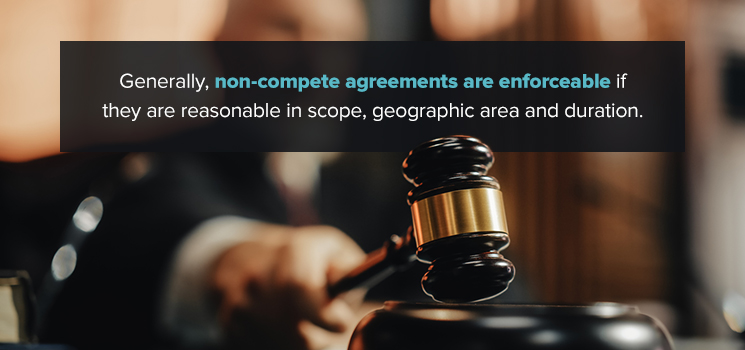By Derrek Cummings on June 5th, 2017
Non-Compete Agreements in Pennsylvania
You may be asked to sign a non-compete agreement for your job as part of your contract. If you see a non-compete agreement in your job contract, you may wonder whether signing is in your best interests or whether it will potentially harm your career prospects later on.
Non-compete clauses are primarily designed to protect the interest of employers, not employees. They restrict employees, preventing them from joining competitors or establishing businesses similar to the employer’s. Thus, before signing any employment agreement, reviewing the terms carefully and consulting a lawyer for professional advice is crucial. If you have already signed the agreement, an experienced employment attorney can help you determine whether the non-compete clause is enforceable.
What Is a Non-Compete Agreement?
A non-compete clause is designed to prevent you from sharing proprietary information you learn with your current employer in the interests of another employer. It means you may not be able to work for certain competitors if you leave your current job or are terminated.
In most cases, your agreement will be based on geography and time, meaning you will not be able to work for a competitor within a specific geographic distance, and the clause will be in effect for a specific period of time after you leave your current employment. For instance, the contract may state you cannot work for a competitor within the same state for up to one year after leaving your current employment.
For employers, non-compete agreements protect their investment in employees and their trade secrets. With a non-compete agreement, a worker cannot leave a company and use the training and information from the company to launch their own business or to enrich a competitor.
In the past, it was largely executives who had to sign non-compete agreements. Today, however, these clauses are appearing in contracts across all industries and employment levels. A non-compete agreement can affect your ability to start your own company and your ability to apply for new jobs if you leave your current employment.
For this reason, contact Weisberg Cummings, P.C., if you are asked to sign an employment agreement with a non-compete clause. Our attorneys can determine if the clause is enforceable and in your best interests. They can also try to negotiate for a more flexible clause if you require one. In the meantime, let’s walk you through the legalities of a non-compete and what it might mean for you.
Is a Non-Compete Agreement Legal?
Non-competes in Pennsylvania are legal and quite common. As businesses try to protect intellectual property and trade secrets, they may include stricter non-competes to protect their interests. The law permits employers to include non-compete clauses in employment contracts.
In most cases, employees get no extra compensation when signing these agreements at the beginning of their employment. This means you may be giving up future flexibility, job opportunities and negotiating power without getting anything in return.
Are Non-Competes Enforceable in Pennsylvania?
Non-compete clauses are enforceable and legal in Pennsylvania as long as they reasonably protect the business’ interest and have reasonable duration and geographic restrictions. However, they may be challenging to enforce.
A company may not check to see whether an employer has chosen to work for the competition, for example, and so many employers do not enforce the clause. Enforcement suggests expending additional resources on tracking former employees. When an employer does pursue an ex-employee for violating their non-compete agreement, they have to weigh the risk and reward since the court could find in favor of the defendant.
Will a Non-Compete Hold up in Court?
Generally, non-compete agreements are enforceable if they are reasonable in scope, geographic area and duration. Pennsylvania courts will usually scrutinize the agreement to ensure it is not overly restrictive and does not impose unconscionable hardship on the employee.
The scope must be reasonable in terms of the activities they prohibit. The duration must also not be excessive. For example, a non-compete that prevents an employee from ever working with a competitor will likely be unenforceable. The geographic area in which the clause applies must also be reasonable and usually relate to the employer’s legitimate business interests. Examples of legitimate business interests include trade secrets, confidential information, specialized training and customer relations.
Ultimately, whether a non-compete clause will hold up in court depends on the facts of each case. It’s best to consult an employment attorney for tailored advice.
Do Non-Compete Agreements Apply if You Were Fired?
In some cases, non-compete clauses are found to be non-enforceable because of how an employee left their employment. For example, in the case of Insulation Corporation of America v. Brobston, the Pennsylvania Superior Court decided against the employer in a non-compete dispute. In that case, Brobston was a sales representative who had access to confidential business information about Insulation Corporation of America. The company fired him for poor performance, including his refusal to take business trips and failing to act in the best interests of the company.
The employer sought to enforce the non-compete clause in his contract, which prevented him from working for a competitor within a 300-mile radius for two years. The Pennsylvania Superior Court deemed that an earlier injunction against Brobston be reversed, arguing that an employee terminated for poor performance did not pose a threat to the business interests the way a high-performing salesperson might.
The court also deemed that a salesperson terminated for poor performance did not pose the same competitive threat as an employee leaving to work for the competition.
How Much Does It Cost to Fight a Non-Compete?
The cost of fighting non-compete agreements can vary depending on various factors, such as the case’s complexity and the duration of the legal battle. Other contributing factors include the following:
- Attorney fees: Legal representation usually attracts a fee unless the attorney agrees to do the case pro bono. Lawyers have different rates depending on factors like experience and reputation. Lawyers may also charge a fixed amount, a percentage of the total awarded damages or by the hour.
- Court costs: These are costs you incur for accessing the court, whether to prosecute or defend a case. Common examples of court costs are filing fees and deposition costs.
- Potential settlement costs: If you settle the case out of court, you may incur certain expenses. Examples include negotiation fees and expenses for finalizing the settlement agreement.
- Appeal costs: Either party may decide to appeal if they lose the case or disagree with a portion of the judgment. Appeal costs may include added attorney fees and court expenses.
What Happens if You Break a Non-Compete?
If you break a non-compete and your employer chooses to pursue compensation in court, there are ultimately two outcomes. The court may find the non-compete enforceable or non-enforceable.
If the court finds that your non-compete is overly broad and does not negatively impact your former employer, generally, the non-compete will be ruled as non-enforceable. In this case, you will be free to continue working with your new employer. If the court finds that you have breached your non-compete agreement, there are a few various outcomes that can occur based on how severe the court deems the damage to be.
What Are the Reliefs for Non-Compete Claims?
Employers may obtain different legal remedies if the court finds the non-compete is enforceable and the employee breached the agreement:
1. Injunctive Relief
An injunction is a legal order that requires a person to do or refrain from doing a specific action. It gives the court the authority to solve the non-compete breach if monetary damage can’t be proven or isn’t pursued. Within this context, the court may order the employee to stop working with the new employer or cease operations if they start a business that is prohibited under the non-compete agreement.
There are different types of injunctions. For instance, the court may give temporary orders preventing the employee from working with the new employer until a full hearing has been held. When the case ends, the court may prohibit the employee from working with the new employer for the entire duration stipulated in the agreement.
2. Monetary Damages
Employers can also seek damages from former employees. Here are the four most common types of monetary compensation they will seek:
- Compensatory: The former employee is required to compensate the plaintiff for lost profits due to the breach.
- Punitive: In comparison to compensatory damages, punitive damages require strong evidence of malicious conduct.
- Liquidated damages: Stated in the non-compete, this is the amount the employee agreed to pay if they breached the non-compete.
- Court attorney fees: The successful side may ask for court fees to be compensated, although awarding these are at the discretion of the court and typically must be part of the agreement.
When a Non-Compete Is Reasonable?
The Pennsylvania Superior Court also sided against the enforcement of non-competes in All-Pak, Inc. v. Johnston, deeming non-competes should not be enforced in situations where employees were laid off due to downsizing and therefore needed additional access to economic opportunities.
Courts usually find non-competes reasonable if the employer can demonstrate that the clause is:
- Necessary to protect a business’s interests
- Reasonable in time and scope
- Designed to protect proprietary information and not just data publicly available
- Signed either at the start of an employment relationship or when employment undergoes a significant change
While it can be hard to enforce a non-compete, keep in mind it is possible. Do not sign an agreement assuming you can ignore it later when you are applying for jobs. If you violate the terms of your non-compete agreement, your former employer can sue you and seek a temporary injunction against you. You don’t want to be involved in a lengthy legal process and keep in mind the legal process can also affect your employment opportunities. Do not rely on non-enforcement. Instead, negotiate before you sign an agreement.
If you are asked to sign a non-compete agreement, have it reviewed by an employment attorney to determine whether the clause is legal and enforceable. Contact Weisberg Cummings, P.C., before signing to determine how the clause might affect your future career and to negotiate the agreement to reflect your best interests.
What To Look for in a Non-Compete Agreement
Before you sign any non-compete agreement, you will want to consider your own goals and plans. When presented with a job offer and employment contract, you may plan to be with the company for years to come, but many things can change:
- The company can terminate your employment
- Your career goals may change
- You can decide to leave
- You may even decide to open your own company
A non-compete can affect your ability to open a business, so if you have plans of eventually launching your own company, you will want to review your employment contract with an attorney. Even if you plan on staying with your current employer for some time, consider what would happen if you had to leave the job for any reason. Would the non-compete essentially lock you out of your industry for years? If so, it could have a permanent, detrimental effect on your career.
Is a Non-Compete the Right Decision for You?
When looking at a non-compete, consider your career situation:
- Early career: If you are just starting your career in Pennsylvania, you may make several career moves, and any non-compete clause can hurt your ability to build your career. If you are a freelancer or independent contractor, it is very disadvantageous to sign any non-compete clauses, as it can severely limit which clients you can take on in the future.
- Multiple jobs: Another thing you will want to consider is a second job. Today many people need or want to moonlight to earn more. A non-compete may contain clauses preventing you from taking a second job or moonlighting. This can limit your ability to earn more in times when you need to increase your earning power.
- Industry competition: If you are in a competitive industry with only a few major players, a non-compete clause can essentially mean you would need to make a career change if you ever left your current employer. Are you prepared to do that? If you look at the non-compete and feel you would be reluctant to leave the position because you would worry about the terms of the clause, negotiate the agreement.
- Geographic restrictions: Take a look at geographic restrictions, too. Would you be able to retain your current place of residence, or would you need to move to get a job in your chosen field? If you have a home and mortgage in your current area, a wide-reaching geographic limit could mean a complicated move.
Look for places where you can negotiate a non-compete clause, and always consult an employment attorney before signing this kind of agreement. An attorney at Weisberg Cummings, P.C., can help you explore how a non-compete could affect you in the future and can attempt to negotiate for better terms. Cutting back the geographic limits and the time frame could mean the clause still allows you to enjoy good career prospects after you leave.
How to Negotiate a Non-Compete Agreement
If you want to negotiate a non-compete agreement, it is best to work with an employment attorney. Trying to negotiate yourself can be a challenge since you may be worried about losing the job offer, and employers may not be receptive to changing the employment agreement without an attorney involved. In general, you will want to focus negotiations on a few areas:
1. Whether You Need a Non-Compete Agreement
Ideally, you do not want a non-compete clause at all, as it will affect your career opportunities after you leave your current employment, regardless of why you exit. If you cannot get your employer to abandon the non-compete entirely, work on reducing the restrictiveness of the clause and make the non-compete as precisely worded as possible. However, your first consideration should be not to sign at all since it offers you no advantage at all.
2. Geographic Restrictions
Try to narrow down geographic restrictions from a national to a more local level or from a state level to a smaller radius. In today’s market, where so much business takes place online, some companies want to extend their non-competes online and over large geographic regions. This can severely limit your ability to find new work.
3. The Time Frame
Try to negotiate the non-compete to a year or less. Anything longer can affect your long-term career plans. Also, negotiate to have the non-compete clause expire after you have worked with the company for a year or two years. This means after you have supplied your energies and talents to the company for an extended period of time, you can leave without being penalized.
Another option for negotiations is to delay when the non-compete starts. This ensures you can check to see if the employment opportunity is a good fit. Delaying the start of the agreement by a month or two means you can leave employment within the designated time frame and be able to choose to work for any other company you like, with no restrictions.
4. Definitions of Companies
Make sure the clause outlines which companies, specifically, you cannot work for. If the agreement is too broad, you could be barred from taking on any work in your industry. If you have specific technologies and companies named, you are leaving yourself some options since new companies may form eventually, and you may have the option of working at those companies.
Also, seek to remove any restrictions on creating your own business in the same field. In the event of an economic downturn or significant personal changes, being able to create your own business can be an important option to have.
5. Compensation for Your Non-Compete Agreement
If your employment is in a very competitive field, your employer may refuse to negotiate the terms of the agreement. If your employer bars you from working in your field if you leave the company, you may negotiate a compensation package that will pay you while you are unable to work under the terms of the non-compete. This way, you will still get income even if you must obey the terms of the clause.
6. Lawyer Fees
The issue of who pays attorney fees can vary depending on the specific language of the agreement. In some cases, the contract may specify which party is responsible for attorney fees if a dispute or legal action arises. If the contract does not address attorney fees, the general rule is that each party pays their own legal fees. However, the addition may be in the fine print, so it’s important to review the contract thoroughly. If the contract states that you will pay legal fees for the company, negotiate to take that out.
7. Circumstances of Your Departure
You may be able to make the non-compete clause less restrictive if you leave due to company changes, bankruptcy or termination. Make sure the agreement outlines when the clause applies. Will you face more restrictions if you decide to leave on your own? Will you face the same limits no matter how you leave? At the very least, negotiate so the agreement is not applicable if the company terminates your employment.
8. Violations
Negotiate so the non-compete agreement clearly outlines the penalties for violations. This way, the company cannot decide to aggressively pursue as much as possible. In addition, seek to have any alleged violations addressed with binding arbitration to save you from lengthy court processes if you are accused of violating the agreement.
What Becomes Official Once a Non-Compete Is Signed
Once you have signed a non-compete, what happens next will vary widely depending on the company. In many cases, the subject will not come up until you leave the company for some reason. At that point, you will be expected to honor the terms of the agreement by not working for the competitors outlined in the contract.
Even then, some employers do not enforce the clauses. However, if you breach the terms of a non-compete, the company may sue. If the company changes ownership, the new owners may also have the option of pursuing legal action.
For this reason, it is important to negotiate your employment agreement before you sign. An employment attorney at Weisberg Cummings, P.C., can help prepare you. If you have already signed a non-compete and now find yourself looking for a new job, contact Weisberg Cummings, P.C., to find out what restrictions your current non-compete could have on your job opportunities.
Rules Behind Changing a Non-Compete Agreement
In Pennsylvania, non-compete agreements are signed as part of the employment agreement and are to be signed at the start of the employment relationship or within a few days of that. For a non-compete agreement to be enforceable, signing a non-compete long after employment acceptance is not usually allowed unless there is a significant consideration to be taken into account.
For example, if your employment status undergoes a significant change, such as a big promotion, this can mean your employer can ask you to sign a non-compete. You will not typically be asked to sign a non-compete just to continue to work in your job,.
If you have already left your employment and now realize your non-compete could hurt your job chances, contact an employment attorney. Rules to non-competes in Pennsylvania may allow you to create a new agreement with your previous employers to both protect their interests and your future income-earning opportunities. An attorney can also explore other options for changing or getting out of the agreement.
How to Get out of a Non-Compete Agreement
If you realize you need to get out of a non-compete agreement, you will want to speak to an employment attorney in Pennsylvania. An attorney can determine if your non-compete clause is enforceable and can review your legal options. In some cases, Pennsylvania courts may “blue-pencil” an agreement to make the clause more reasonable and enforceable. Seeking legal remedies can mean fewer strict restrictions on your future employment opportunities. An attorney can help you understand your options.
- There may be a problem with the agreement itself, which gives you the grounds for breaking it.
- Perhaps you never signed the agreement, or maybe an eligible corporate representative from your employer failed to sign the document.
- Perhaps the contract in your HR file doesn’t have all required signatures.
In all these cases, the agreement may not be non-binding. Take a look at the duties your employer agreed to, as well as the description of your job role and designation. If these things change or if your employer failed to live up to its part of the agreement, you may have grounds for breaking your agreement.
Restrictions and Enforcement of a Non-Compete
It is also important to speak with an attorney about how restrictive your non-compete is. If it prevents you from working with a company using the same software, for example, you may still qualify for jobs at companies using different technology. In these cases, you may wish to consider whether pursuing a renegotiation makes sense. You may still qualify for the job you want, even with the non-compete.
You will also want to review how enforceable your non-compete agreement is. Some companies have every worker sign a non-compete agreement without carefully considering how or if it can be enforced. If the restrictions are very limiting in terms of time and geography, a court is unlikely to enforce them. If your job did not involve any trade secrets or other information that could hurt the competitiveness of your employer, the agreement is likely not enforceable.
Breaking a non-compete clause is not a step to be taken lightly. It can be a complex and involved process. It is much easier to negotiate a non-compete clause before you sign an employment agreement. If you are considering a new job and see a non-compete clause, contact an attorney to review your employment contract and get support in negotiating any clauses that could restrict your career later on.
The attorneys at Weisberg Cummings, P.C., can review any non-compete, non-solicitation or employment agreement and can determine how the agreement could affect your future. Our attorneys can also endeavor to negotiate for better terms, so you can move forward in your new employment with confidence.
Weisberg Cummings Can Help You Protect Yourself
Pennsylvania non-solicitation agreements and non-compete agreements exist to protect companies. However, courts often do not enforce them when companies try to use these agreements to limit employees in unreasonable ways.
If you are offered an employment contract or non-compete agreement, review it carefully before signing. If you have any questions or concerns, bring your non-compete to the attorneys at Weisberg Cummings, P.C., for review and analysis. Our attorneys can negotiate so your best interests are protected. If you’d like to know how to get out of a non-compete agreement or have questions about a non-compete, contact us now for a consultation.





